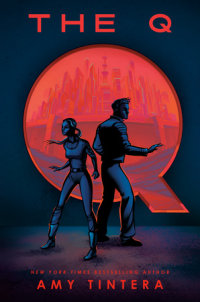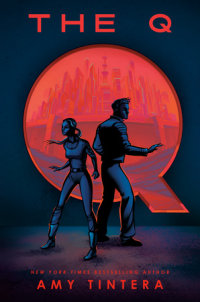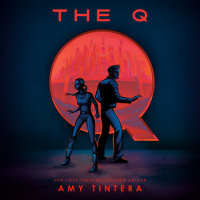Radio Quarantine with Hadley Lopez
Special Joint US/Quarantine Zone Broadcast
Hi, kids, this is Maisie Rojas, coming to you live from the Q.
That’s right, I’m inside the quarantine zone right now. I was born here, actually, eighteen years ago, when all of you were just a twinkle in your parents’ eyes.
Hadley Lopez was kind enough to let me jump on her program today, so don’t worry, all you Q listeners. Your girl will be back shortly.
I’m here today because schools in the good ol’ US of A are trying a new thing this year, letting some of us inside the Q record a segment for you guys as part of your history lessons. Which is cool, I guess. I mean, I always thought school was boring as hell, but maybe I can spice things up a bit for you. And for those of you in the Q, we thought we’d broadcast this to you live, just for fun. If you don’t like it, turn it off! I don’t care.
So! They want me to tell you a little about…
Radio Quarantine with Hadley Lopez
Special Joint US/Quarantine Zone Broadcast
Hi, kids, this is Maisie Rojas, coming to you live from the Q.
That’s right, I’m inside the quarantine zone right now. I was born here, actually, eighteen years ago, when all of you were just a twinkle in your parents’ eyes.
Hadley Lopez was kind enough to let me jump on her program today, so don’t worry, all you Q listeners. Your girl will be back shortly.
I’m here today because schools in the good ol’ US of A are trying a new thing this year, letting some of us inside the Q record a segment for you guys as part of your history lessons. Which is cool, I guess. I mean, I always thought school was boring as hell, but maybe I can spice things up a bit for you. And for those of you in the Q, we thought we’d broadcast this to you live, just for fun. If you don’t like it, turn it off! I don’t care.
So! They want me to tell you a little about the history of the Q, from my perspective. I told them it was probably a bad idea to let me do this, but here we are. No one can say I didn’t warn you.
All right, they told me to start at the beginning, which I think you all already know, but whatever. They said they want to hear my version of events. So here we go.
There was a virus, and it was bad. Death, sadness, et cetera.
I’m probably supposed to tell you some science stuff here, but I slept through those classes. You have the internet out there, don’t you? You can look it up.
Anyway, this virus started in Austin, Texas, which I hear was a pretty nice place back in the day. It quickly spread to Houston and Dallas and some other places I forgot. The US government, which had dealt with two major pandemics in the past twenty years, was like, “Yo, we got this, we got this.”
They built a massive quarantine zone around Austin and started shuttling all the sick people over there. Everyone without symptoms went to a separate quarantine zone.
Problem was, a lot of people couldn’t get out of the Austin quarantine zone, even if they weren’t sick yet. Some people, like my parents, didn’t have a car and couldn’t catch one of the buses because there weren’t nearly enough. You had to, like, fight to the death to get on one of those buses, and my parents weren’t about that life.
Your history classes will probably teach you that it was just the unlucky people or the stupid ones who stuck around and caught the virus, but that’s a load of shit. It was mostly just the poor people.
Wait, Hadley is holding up a piece of paper telling me I can’t say “shit.” Well, fu . . . dge. I’ll try to clean up the language, kids.
Right, so we have this quarantine zone with all the sick people, and it’s a real bummer in there, because it turns out that the virus has a 40 percent mortality rate.
On the upside, the president of the United States has become a damn hero for containing the virus before it spread outside of Texas and killed half the world’s population. Good for him, I guess.
Meanwhile, the 60 percent who lived and were still in the Q were like, “Hey, are we getting out of here or what?”
Spoiler alert: they did not get out.
Because, bad news—this virus does not provide long-term immunity to people who get infected with it. Which meant everyone inside the Q kept getting sick, over and over, and no one could develop an effective vaccine because the virus kept mutating. On the plus side, the mortality rate kept getting better, so people weren’t dropping dead left and right anymore.
People started to try to escape the Q, which did not go great for them. President Howard was like, “Yo, that’s not cool,” and built a huge-ass wall around the whole Q to keep us all in.
He said it made people feel safer while they worked on a vaccine. Dude had to do something—it was an election year!
He won, by the way.
Inside, everything went to hell. Laws didn’t apply anymore. All the military and law enforcement we had in here peaced out and stopped showing up for work. Which, fair enough, considering they hadn’t been paid for like a year.
Eventually, the Q seceded from the US and we figured things out ourselves. Now the Q is ruled by two gangs—or families, as we usually refer to ourselves—the Spencers up north and the Lopez family down south. The Spencers are jerks and the Lopezes are geniuses who figured out the artificial organs that are keeping all our asses alive.
Oh wait, now Hadley is telling me to stop because she thinks I’ve broken too many of their arbitrary rules.
Well, for all of you still listening up here in the Q, I will end this history lesson because history is boring as shit.
Let’s get to the good stuff.
Lennon
This was not the first time Lennon Pierce had been kidnapped.
The first time was fifteen years earlier. He had no memory of it, but when he was four years old, he apparently wandered away from his parents at the farmers market. A woman had given him a cookie, scooped him up, and made a beeline for the parking lot.
His mom saw the kidnapper just in time, started screaming, and chased the woman down. According to his parents, he’d been completely unfazed by the whole thing. He was happily eating his cookie when his mom snatched him back from the stranger.
Later, the would-be kidnapper claimed she didn’t know that the young boy was the son of a congressman. She’d just thought he was cute.
She never gave much more of an explanation than that, which had always baffled Lennon. Impulse-kidnapping a small child just because you liked his chubby cheeks didn’t make a whole lot of sense.
This was not an impulse kidnapping. He’d glimpsed the bodies of his two secret service agents before they’d tied a blindfold over his eyes.
He was in some deep shit this time.
He’d lost track of how long he’d been in the van. For a while, he’d been able to see hints of sun from the bottom edge of his blindfold, if he tilted his head up. It had been a relief, because there’d been nothing but darkness since they grabbed him from a gas station.
But now it was dark again, and he could have sworn he’d been on this bumpy ride for at least two days. But that couldn’t be right.
His hands were cuffed behind his back. Everything ached. His wrists, where the cuffs dug in; his back; his ass, from sitting on the hard floor. They could have at least let him sit on a seat. Maybe this vehicle didn’t have them.
His stomach rumbled. They’d given him a few sips of water but no food, and he felt weak. He’d considered running, the first day. Or fighting back, when he got the chance. Now he was pretty sure that would not go so well.
The vehicle screeched to a stop so suddenly that he toppled over onto his side. He stayed there, listening to the sounds of two doors slamming shut.
Another door opened. Someone grabbed his ankle. He heard a snap as they cut off the plastic tie.
“Get out,” a male voice said. Southern accent. They’d taken him from Georgia, but Lennon had no way to know if the accent was local to the area. He was from Los Angeles. Everyone down here sounded the same to him.



